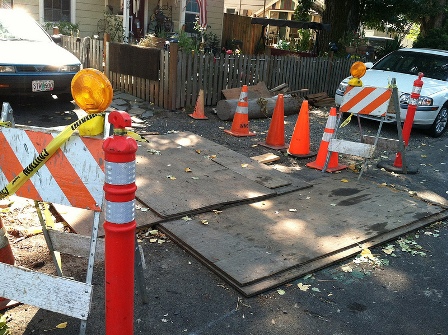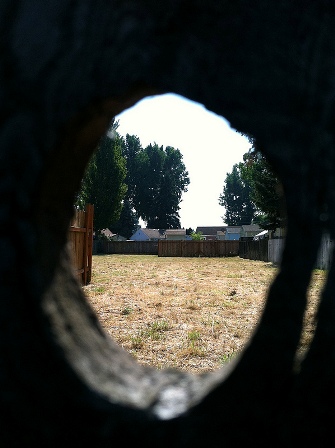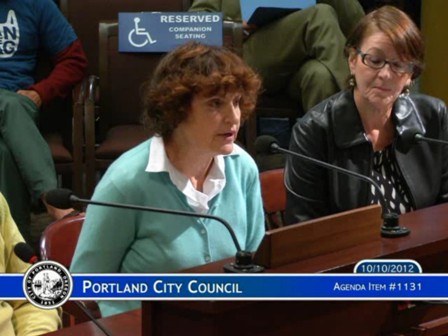 Residents say the quality of work the City has done at Snoozy's Hollow is poor, and in at least one spot the new sewer is already broken -- meanwhile the resident there has to pay for the repairs. Residents say the quality of work the City has done at Snoozy's Hollow is poor, and in at least one spot the new sewer is already broken -- meanwhile the resident there has to pay for the repairs. |
The plight of the Snoozy's Hollow neighborhood in Northeast Portland came to a head Wednesday as the Portland City Council unanimously approved a plan adding $16,000 liens on residents' homes – with the promise of $3,000-$10,000 more debt later -- to build them into the city's grid for individual water service, sewer services and roads with storm drains.
The problem with that, homeowners say, is that with so many houses valued between $40,000 and $45,000, the city's Limited Improvement District (LID) agreement forces liens onto the properties that will erase their equity and make them impossible to sell for those property owners who can't afford the payments.
Resident Kay Williford appeared to wipe away tears Wednesday morning as she tried to explain to Commissioners that she expected to lose her home under the agreement – and she says other residents already have.
Williford was brought to the meeting in her wheelchair and with her arm in a sling.
"I tried to speak to you before this happened but it didn't help," she told Commissioners.
"A vote was not ever allowed or permitted," she said of the LID. "Old homeowners, new homeowners all come to find all these liens and fees -- one third the neighborhood is empty right now."
The Council technically had to approve "assessments" regarding two different agreements: One for water hookup and one for sewer connections.
In fact, a document obtained by The Skanner News shows that the City entered into the LID with only 31 percent participation by the residents – and that the homeowner's association president asked for special permission from Commissioner Randy Leonard's office to submit the LID application without getting more residents onboard with the idea.
Corruption but No Action
Snoozy's Hollow is surely one of the oddest communities in Portland. And so much that has happened there over the past 20 years seems like pure corruption – but residents say they can't find a single government agency that can do anything about it.
 The Snoozy's Hollow common area has been fenced off and locked for more than a year, residents say -- a violation of the HOA's operational rules. But City officials say they have no jurisdiction over a homeowner's association-run property. The Snoozy's Hollow common area has been fenced off and locked for more than a year, residents say -- a violation of the HOA's operational rules. But City officials say they have no jurisdiction over a homeowner's association-run property. |
Located exactly across the levee from what used to be Vanport City, Snoozy's -- these days technically known as Deltawood -- is named after Earl Snoozy, who bought the property in 1948 and turned it into a private community run by a Home Owner's Association (HOA).
Only 41 homes, most World War II temporary housing just like Vanport was, Snoozy's Hollow has until now never been hooked up to City water, sewer or road services, getting by for generations with just one water main – one very small, rusty, broken water main that by all accounts has leaked heavily for many years.
Originally, City officials set up the LID with the proviso that before any improvements were made, the HOA would have to pay its back water bill, which by 2009 reached over $100,000.
That's because in past years the HOA did not pay its own water bill even though residents paid as much as $200 per month in dues, according to residents and a 2009 report in the Oregonian.
But that requirement has fallen by the roadside; Water Bureau spokesman Tim Hall says the Deltawood HOA has now been turned over by the City to a collection agency to recover some of the money from the past due water bill.
Residents say the City is essentially forcing them to pay for the water twice by putting them on the hook for the HOA's years-past water bills -- but City officials counter that homeowner associations are not regulated by the City, and there's nothing that can be done to force the HOA to bail itself out.
Worthless Homes, Costly Infrastructure
Former KATU journalist Anita Kissee reported in 2009 that the City's LID was set to cost $1 million, but that while residents were expected to pay for it, the value of the homes there – many with chronic water damage already -- was dwarfed by the cost of the construction.
Deltawood Homeowners Association President Lorna Baxter told Kissee that she expected property values to go up after the improvements, and that she expected that some people would undoubtedly lose their homes because of their inability to pay.
"Well, our property values will go up and be, I think, equivalent to the rest of the market," Baxter told KATU three years ago. "Unfortunately, you know, we'll have casualties, just like everywhere else."
Since the first LID proposal the City moved to cap the cost of the improvements, but residents say it's still too much.
The one homeowner who protested to the City Council that the agreement would be a hardship, has already lost his home to foreclosure and moved away with his family, one neighbor told the City Council at its meeting Oct. 10.
That's when City staff from the Water, Environmental Services and Transportation bureaus presented an update on the Local Improvement District negotiated in 2009 by the City and the Deltawood HOA.
29 Percent Foreclosure Rate
 Snoozy's Hollow property owners Christine Hermann, at left, and Lindy Lou Nicola say the City's liens against homeowners will throw residents out on the street. Snoozy's Hollow property owners Christine Hermann, at left, and Lindy Lou Nicola say the City's liens against homeowners will throw residents out on the street. |
Baxter, who currently is suffering from a severe medical condition, did not respond to requests for comment for this story, nor did Jed Spera, contracted by the HOA as its "community manager." Neither appeared at any of the City Council hearings.
At the conclusion of City officials' Power Point presentation about the benefits of the arrangement at the Council meeting Oct. 10, two property owners spoke out against the assessments.
Putting liens on the homes will drain them of equity and make them unsellable, property owner Christine Hermann told Commissioners.
Hermann introduced an array of documents, including RMLS statements showing the only six homes sold in the past three years were priced at $50,000; $49,000; $40,000; $36,900; $31,000; $29,500.
The foreclosure rate since 2008 is 29 percent, she testified.
"I think it's important for the council to understand the Phase I and Phase II liens are not the only hardship the city is imposing on these predominantly very low-income homeowners.
"It's a triple burden. Number one, the liens. That's a maximum of $16,500 and I appreciate that the city reduced it from over a $20,000 maximum.
"The residents must connect to the city sewer within a very short period of time, and my discussions with the city staff indicate these are likely to range from $3,000 to $10,000.
"Also the HOA owes the city $63,000 which these homeowners must repay.
"I appreciate the fact that you have the safety net program, and I think that's great. That safety net program may defer payments to those who qualify, but still, even for those who qualify, the principal and interest is accruing -- which wipes out any equity that any of these homeowners may have."
"These people will never be able to pay that kind of money, if they do they will have to walk away," said Lindy Lou Nicola, a Snoozy's Hollow property owner. "They will not have a choice."


